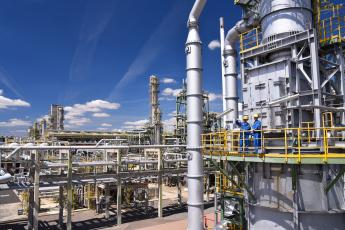Nothing is more important to the fuel and petrochemical industries than the safety of our employees, communities and the environment. This commitment is embedded in the culture of our industries, and one of the ways that it is expressed is through strong and ongoing support of community safety efforts. U.S. refiners and petrochemical manufacturers invest extensively to help provide equipment, funding and training for emergency response units.
CITGO’s Lemont, Illinois refinery, for example, recently gave its second round of Community Awareness Emergency Response grants, awarding a total of $60,000 to first responder agencies in nearby communities. These grants will be used to fund a search-and-rescue drone program, replace automated external defibrillators, purchase digital speed signs, pay for two students’ paramedic schooling, enable the purchase of a mobile security camera system and help upgrade Will County’s emergency alerts app.
The Motiva First Responder Grant Program likewise invests in its communities, giving nearly $159,000 to 23 emergency response organizations nationwide so far this year. Since the program was introduced in 2021, Motiva has given more than $289,000 in grants to 40 organizations.

Plains All American has given over $250,000 to 25 first responder organizations, including $25,000 to the National Spill Control School at Texas A&M University-Corpus Christi for the purchase of new emergency response and hazardous waste operations equipment, $20,000 to Cheyenne Fire Rescue in Wyoming for a spill response trailer and equipment, $30,000 to the Wildlife Center of Texas for general operation costs and $25,000 to the Northeast Midland County Volunteer Fire Department (in partnership with an upstream partner) towards the expansion of their fire station to increase equipment storage and training space.
AFPM members also step in to help when small and volunteer departments face a funding shortfall.
The Murphreesboro Volunteer Fire Department in Mississippi, for example, got a new fire truck, but its budget didn’t extend to the cost of new equipment. Marathon Pipe Line’s Capline Oakland Station stepped in, awarding a $5,000 grant – double the amount requested – to purchase the new hoses, nozzles and air packs needed for the truck.

Marathon’s midstream segment, MPLX, similarly aided the Butler, Oklahoma Volunteer Fire Department with a $17,000 grant – and also provided a $500 donation to each of the 10 fire departments located in the county. The grants were used to purchase communications equipment as well as a new Self-Contained Breathing Apparatus (SCBA) to wear while entering a fire or HAZMAT situation.

Chevron Phillips Chemical’s Texas facilities recently provided SCBA full-face respirator masks, firefighting supplies, battery-operated extraction tools and even two fire trucks – valued at nearly $60,000 – to their local community and volunteer fire departments.
This close relationship with volunteer fire departments extends to industry employees too, where many. serve in their local volunteer fire departments. Phillips 66, in fact, has a volunteer grant program and “some of the biggest beneficiaries are local volunteer fire departments which often receive up to $4,000 per Refinery employee who serves in a volunteer capacity,” said Melissa Erker, Phillips 66 Director of Government and Community Relations.
AFPM members also support world-class training for community first responders. Three times a year for three decades, CITGO has hosted a multi-day emergency response training program at Texas A&M Engineering Extension Service (TEEX) for volunteers. CITGO instructors give master classes on topics like proper procedures, prop handling and PPE to upwards of 100,000 emergency responders and workers.
Placid Refining lends its expertise to the North and West Baton Rouge Parish Emergency Response Task Forces, and also sponsors a “Safety Town” to teach basic safety information to West Baton Rouge first graders.
PBF and Monroe Energy collaborate with industrial partners for both training and execution of safety procedures, working with the Delaware Bay and River Cooperative and neighboring facilities to plan for and align on response strategies if ever there are spills on water.
“AFPM member companies provide critical support, training and funding to local first responders nationwide,” said Lara Swett, AFPM Vice President of Technical and Safety Programs. “These partnerships yield real results in terms of better trained and equipped first responders – which help us advance our shared goal of safer communities.”
The American Fuel & Petrochemical Manufacturers (AFPM) is the leading trade association representing the makers of the fuels that keep us moving, the petrochemicals that are the essential building blocks for modern life, and the midstream companies that get our feedstocks and products where they need to go. We make the products that make life better, safer and more sustainable — we make progress.


